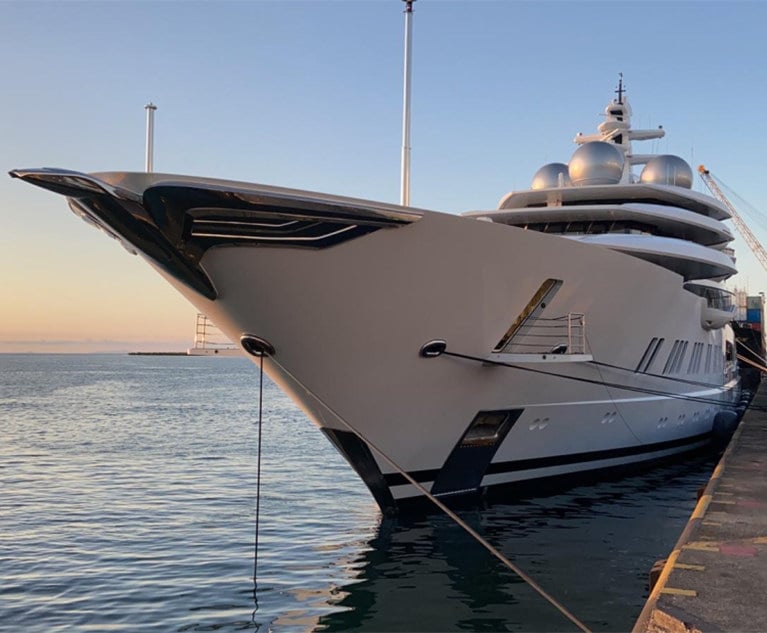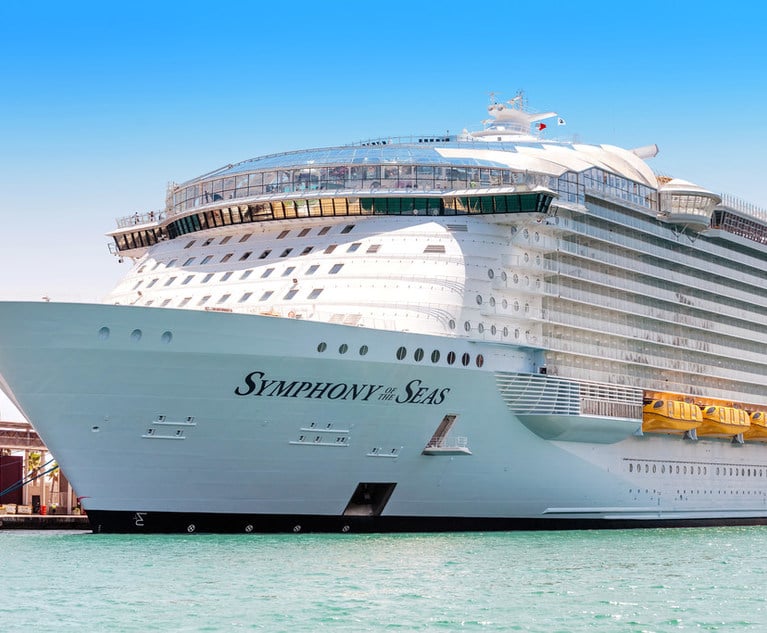Miami Lawyers Insulate RV Refrigerator-Maker From Major Class-Action Lawsuit
A putuative class action lawsuit against RV refrigerator manufacturer Dometic Corp. failed before U.S. District Judge Robert Scola, who denied certification.
September 30, 2019 at 02:46 PM
7 minute read
 Erica Rutner, Jonathan Williams of Lash & Goldberg, and Edward Soto of Weil, Gotshal & Manges led the defense team. Courtesy photos.
Erica Rutner, Jonathan Williams of Lash & Goldberg, and Edward Soto of Weil, Gotshal & Manges led the defense team. Courtesy photos.
Miami attorneys Erica Rutner and Jonathan Williams of Lash & Goldberg, and Edward Soto of Weil Gotshal & Manges led a team of attorneys in warding off a putative class-action lawsuit against Pompano-based manufacturer Dometic Corp. over claims its refrigerators contained a design defect that caused them to leak flammable gases.
Dometic makes products for recreational vehicles, including gas-absorption refrigerators, popular with travelers because they don't need to be plugged in to work. But in 2006 and 2008, the company recalled some of its refrigerators, having discovered that under certain conditions the release of a coolant could result in fires.
The plaintiffs sued on behalf of anyone who'd owned an allegedly defective fridge, claiming the recalls hadn't fixed the problem. But U.S. District Judge Robert Scola found they hadn't met the threshold for class-action certification.
The case included a long procedural history that started with the recall, when Dometic addressed the problem and provided fire-prevention kits. Ten years on in 2016, Dometic's competitor Norcold Inc., which also recalled its refrigerators over the scare, was hit with a lawsuit. That resulted in a $36 million class settlement but also led to a dispute between plaintiff attorneys.
Those attorneys split into two groups, which sued Dometic in California and Florida, alleging that its retrofit kits didn't properly guard against fires. They also claimed there was a risk the units would leak, corrode and eventually fail. The plaintiffs did not allege fires but instead sought reimbursement for anyone who had bought a Dometic refrigerator.
The Florida case moved faster, resulting in summary judgment for Dometic, before the California case had been litigated. Scola ruled that the plaintiffs lacked standing, finding their injuries were only speculative because their refrigerators still worked.
But that ruling wasn't binding because the class was never certified, which meant the plaintiff side could bring two new lawsuits in Florida in California with different named plaintiffs. This time, they alleged fires but still sought to recover economic losses for everyone who'd ever bought a refrigerator.
'A second bite of the apple'
Rutner and her team convinced the courts to consolidate the remaining three cases into one, filed in the Southern District of Florida, where Scola would again preside.
It was a bit like playing chess, the way Rutner sees it.
"Now, the plaintiffs who had that big dispute in Norcold were forced to work together because we forced them all together," Rutner said.
The plaintiffs alleged that boiler tubes in cooling units were prone to premature corrosion, causing dangerous gases to leak and create a serious fire hazard. But the defense argued their testing had shown otherwise.
The discovery period was short, but resulted in about 45 fresh depositions, 15 new expert reports and thousands of extra documents, according to Rutner, who said that was a big obstacle for her team.
"The plaintiffs attorneys were allowed to learn from their mistakes and have a second bite of the apple, essentially," Rutner said.
What's more, each of the plaintiffs brought individual negligence and strict product liability claims over their alleged fires, which is unusual in class-action suits—and meant a lot of discovery for the defense.
"Those are the type of lawsuits that would always be litigated individually, so it was sort of like a litigation within a litigation," she said.
This time, the putative class included present and former owners of refrigerators, which they alleged were not worthless, but worth less than what they'd paid. Rutner estimates that could have included about 10 million class members seeking hundreds of millions in damages.
The plaintiffs attorneys include John Scarola of Searcy Denney Scarola Barnhart & Shipley in West Palm Beach, who confirmed they are appealing.
"We have every intention of continuing to proceed with prosecution of our claims," Scarola said.
Scarola stressed that Dometic's refrigerators have caused serious problems.
"Those appliances are most commonly installed in recreational vehicles, where the fires can be of particularly serious consequences because they occur in confined spaces," he said.
Surprise ruling
Scola's denial of class certification took both sides by surprise, Rutner said, because it came on the same day a magistrate judge was scheduled to hold an evidentiary hearing on Daubert motions.
"We all showed up to the courtroom for the hearing with about 15 experts in tow and 25 lawyers, and five minutes before the hearing is about to start, literally 9:55 a.m., Judge Scola issued a ruling denying class certification," Rutner said. "It was an interesting posture to be in, just to have everybody in the courtroom when the order came down like that."
Even the magistrate didn't know about the ruling until five minutes prior, according to Rutner.
"We thought [Scola] might have issued a ruling before the hearing, based on the grounds that he ultimately ruled on," she said. "But when we didn't get a ruling the night before the hearing, we certainly did not think that that morning we were going to get a ruling."
The decision turned on ascertainability, an implicit requirement within Rule 23 of the Federal rules of Civil Procedure that means courts must be able to use objective criteria to determine who's in a class. Interpretations of how important the requirement is vary nationwide, but the Eleventh Circuit has sided with courts that say it's crucial to class certification.
Rutner's team argued the plaintiffs couldn't meet the ascertainability requirement because their definition of class members—anybody who bought a Dometic fridge—was vague and not administratively feasible. That's because Dometic predominantly sells its products to RV manufacturers, not directly to consumers.
Rutner's team highlighted that even when Dometic recalled its fridges, it couldn't be sure who had bought them, so they sent notices to thousands more people than who actually had.
"If you want to determine who has a Dometic refrigerator, you basically have to take the word of the consumer, as Dometic then has no way to challenge that," Rutner said.
The ruling highlights, in Rutner's view, the importance of the ascertainability requirement, at least in areas like the Eleventh Circuit.
"Plaintiffs cannot just try and skirt around the issue," Rutner said. "It is a real obstacle to class certification and it should be something that parties and litigants really think strongly about when they're preparing their respective positions."
Rutner said it's been a "long, arduous process" for Dometic, which hopes its legal troubles will end with Scola's ruling, though it's only binding for the named plaintiffs.
Read the ruling:
Case: Varner et al v. Dometic
Case no.: 1:16-cv-22482-RNS
Description: Magnuson-Moss Warranty Act
Filing date: June 24, 2016
Judgment date: July 24, 2019
Judge: U.S. District Judge Robert N. Scola
Plaintiffs attorneys: Caleb Marker, Christopher Ridout, Hart Robinovitch, Zimmerman Reed, California; John Scarola, Searcy Denney Scarola Barnhart & Shipley, West Palm Beach; Adam Moskowitz, The Moskowitz Law Firm; Coral Gables
Defense attorneys: Erica Rutner, Jonathan Williams, Martin B. Goldberg, Greg Weintraub, Nicholas Ortiz, Gina Rhodes, Emily Pincow, Lash & Goldberg, Miami; Edward Soto, Weil Gotshal & Manges, Miami.
Read more:
Broward Lawyer Lands $1.25M Judgment Over Client's Unpaid Puerto Rico Hurricane Relief Work
South Florida Lawyers Score $40M Verdict for BrickellHouse Over Failed Robotic Garage
This content has been archived. It is available through our partners, LexisNexis® and Bloomberg Law.
To view this content, please continue to their sites.
Not a Lexis Subscriber?
Subscribe Now
Not a Bloomberg Law Subscriber?
Subscribe Now
NOT FOR REPRINT
© 2025 ALM Global, LLC, All Rights Reserved. Request academic re-use from www.copyright.com. All other uses, submit a request to [email protected]. For more information visit Asset & Logo Licensing.
You Might Like
View All
Second DCA Greenlights USF Class Certification on COVID-19 College Tuition Refunds
3 minute read

Miami Judge Approves Shaq's $11 Million Settlement to Resolve Astrals Investor Claims
3 minute read
A Voyeur Videotaped Them Undressing. Should Cruise Ship Passengers Have to Arbitrate?
3 minute readTrending Stories
- 1Thursday Newspaper
- 2Public Notices/Calendars
- 3Judicial Ethics Opinion 24-117
- 4Rejuvenation of a Sharp Employer Non-Compete Tool: Delaware Supreme Court Reinvigorates the Employee Choice Doctrine
- 5Mastering Litigation in New York’s Commercial Division Part V, Leave It to the Experts: Expert Discovery in the New York Commercial Division
Who Got The Work
J. Brugh Lower of Gibbons has entered an appearance for industrial equipment supplier Devco Corporation in a pending trademark infringement lawsuit. The suit, accusing the defendant of selling knock-off Graco products, was filed Dec. 18 in New Jersey District Court by Rivkin Radler on behalf of Graco Inc. and Graco Minnesota. The case, assigned to U.S. District Judge Zahid N. Quraishi, is 3:24-cv-11294, Graco Inc. et al v. Devco Corporation.
Who Got The Work
Rebecca Maller-Stein and Kent A. Yalowitz of Arnold & Porter Kaye Scholer have entered their appearances for Hanaco Venture Capital and its executives, Lior Prosor and David Frankel, in a pending securities lawsuit. The action, filed on Dec. 24 in New York Southern District Court by Zell, Aron & Co. on behalf of Goldeneye Advisors, accuses the defendants of negligently and fraudulently managing the plaintiff's $1 million investment. The case, assigned to U.S. District Judge Vernon S. Broderick, is 1:24-cv-09918, Goldeneye Advisors, LLC v. Hanaco Venture Capital, Ltd. et al.
Who Got The Work
Attorneys from A&O Shearman has stepped in as defense counsel for Toronto-Dominion Bank and other defendants in a pending securities class action. The suit, filed Dec. 11 in New York Southern District Court by Bleichmar Fonti & Auld, accuses the defendants of concealing the bank's 'pervasive' deficiencies in regards to its compliance with the Bank Secrecy Act and the quality of its anti-money laundering controls. The case, assigned to U.S. District Judge Arun Subramanian, is 1:24-cv-09445, Gonzalez v. The Toronto-Dominion Bank et al.
Who Got The Work
Crown Castle International, a Pennsylvania company providing shared communications infrastructure, has turned to Luke D. Wolf of Gordon Rees Scully Mansukhani to fend off a pending breach-of-contract lawsuit. The court action, filed Nov. 25 in Michigan Eastern District Court by Hooper Hathaway PC on behalf of The Town Residences LLC, accuses Crown Castle of failing to transfer approximately $30,000 in utility payments from T-Mobile in breach of a roof-top lease and assignment agreement. The case, assigned to U.S. District Judge Susan K. Declercq, is 2:24-cv-13131, The Town Residences LLC v. T-Mobile US, Inc. et al.
Who Got The Work
Wilfred P. Coronato and Daniel M. Schwartz of McCarter & English have stepped in as defense counsel to Electrolux Home Products Inc. in a pending product liability lawsuit. The court action, filed Nov. 26 in New York Eastern District Court by Poulos Lopiccolo PC and Nagel Rice LLP on behalf of David Stern, alleges that the defendant's refrigerators’ drawers and shelving repeatedly break and fall apart within months after purchase. The case, assigned to U.S. District Judge Joan M. Azrack, is 2:24-cv-08204, Stern v. Electrolux Home Products, Inc.
Featured Firms
Law Offices of Gary Martin Hays & Associates, P.C.
(470) 294-1674
Law Offices of Mark E. Salomone
(857) 444-6468
Smith & Hassler
(713) 739-1250






